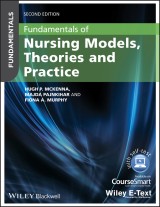Details

Fundamentals of Nursing Models, Theories and Practice
Fundamentals 2. Aufl.
|
29,99 € |
|
| Verlag: | Wiley-Blackwell |
| Format: | |
| Veröffentl.: | 17.04.2014 |
| ISBN/EAN: | 9781118492109 |
| Sprache: | englisch |
| Anzahl Seiten: | 248 |
DRM-geschütztes eBook, Sie benötigen z.B. Adobe Digital Editions und eine Adobe ID zum Lesen.
Beschreibungen
<p>A concise, accessible introduction to the development, application and evaluation of nursing theories, this new edition of <i>Fundamentals of Nursing Models, Theories & Practice</i> provides a thorough overview of the body of knowledge on the topic, and a clear outline of their relevance to everyday nursing practice. Linking the development of theory to practice, this full-updated text features learning outcomes, key concept summaries and reflective exercises to aid the study of this key element of all modern nursing courses.</p> <p><b>Special Features</b></p> <ul> <li>Clearly examines the relationship between nursing theory, clinical practice and nursing roles</li> <li>Accessible and user-friendly with a range of features to help study, including key concepts, learning objectives and reflective exercises</li> <li>Useful for all pre-registration nursing students, as well as newly qualified nurses</li> <li>Accompanied by an online resource centre featuring case studies, multiple choice questions, exercises and activities</li> </ul>
<p>About the series viii</p> <p>Dedication ix</p> <p>Preface x</p> <p>How to use your textbook xii</p> <p>About the companion website xvii</p> <p><b>Chapter 1 The case for nursing theory 1</b></p> <p>Introduction 2</p> <p>The necessity and meaning of theory 4</p> <p>Theory defined 5</p> <p>Construction of theory 9</p> <p>Theory and science of nursing 11</p> <p>Other interpretations of theory 13</p> <p>Main paradigms and philosophies and their influence on the development of nursing science 14</p> <p>Theory and practice of nursing 16</p> <p>Do we really need theory? 18</p> <p>Nursing theories today 18</p> <p>Conclusion 21</p> <p><b>Chapter 2 Knowing in nursing and nursing knowledge 23</b></p> <p>Introduction 24</p> <p>Defining knowing and knowledge 24</p> <p>Philosophies of knowledge 25</p> <p>How do nurses know? 35</p> <p>Developing nursing knowledge 48</p> <p>Conclusion 52</p> <p><b>Chapter 3 Theory from practice and practice from theory 53</b></p> <p>Introduction 54</p> <p>First steps – reflecting on theory 54</p> <p>The questions begged 55</p> <p>Developing nursing theory 56</p> <p>Levels of theory 58</p> <p>The relationship between theory and practice 69</p> <p>The questions begged – some answers 76</p> <p>Conclusion 77</p> <p><b>Chapter 4 Nursing theories and new nursing roles 79</b></p> <p>Introduction 80</p> <p>Defining role 81</p> <p>Background to the development of new roles in nursing 81</p> <p>Some implications of the new nursing roles 84</p> <p>Using theory to understand new roles in nursing 85</p> <p>Conclusion 97</p> <p><b>Chapter 5 Nursing theories or nursing models 99</b></p> <p>Introduction 100</p> <p>Reasons for historical nursing theory evolution 100</p> <p>Model 102</p> <p>Theory 103</p> <p>Theory or model? 104</p> <p>The classification of theories 106</p> <p>Current trends in nursing theories 109</p> <p>The nursing metaparadigm 110</p> <p>Limitations of nursing theories 114</p> <p>Benefits of nursing theories 118</p> <p>Conclusions 121</p> <p><b>Chapter 6 Interpersonal relationships: the essence of nursing models and theories 123</b></p> <p>Introduction 124</p> <p>Types of interpersonal relationships 124</p> <p>Interpersonal theories of nursing 127</p> <p>Implications for nurse education 133</p> <p>Social capital 135</p> <p>Threats to the development of interpersonal relationships in nursing and the use of interpersonal theories 136</p> <p>Conclusion 138</p> <p><b>Chapter 7 How to select a suitable model or theory 140</b></p> <p>Introduction 141</p> <p>Selecting an appropriate nursing theory 142</p> <p>Potential problems when selecting a nursing theory 143</p> <p>Choosing a suitable nursing theory 150</p> <p>Nurses’ own philosophy as a basis for selecting a theory 153</p> <p>A strategy for choice 154</p> <p>Who should select the theory? 155</p> <p>Nursing theories or theories developed by another discipline? 156</p> <p>Conclusion 158</p> <p><b>Chapter 8 Research and theory: some relationships 161</b></p> <p>Introduction 162</p> <p>Building theory through research: an inductive approach 162</p> <p>Is the link between theory and research strong? 165</p> <p>Research in nursing 166</p> <p>Theory-generating research (TGR) 167</p> <p>Theory-testing research (TTR) 171</p> <p>Theory-framed research (TFR) 174</p> <p>Theory-evaluating research (TER) 175</p> <p>Strategies for theory development through research 180</p> <p>Conclusions 184</p> <p><b>Chapter 9 Criteria for theory description, analysis and evaluation 186</b></p> <p>Introduction 187</p> <p>The evaluator of a nursing theory 187</p> <p>Significance of the theory 187</p> <p>Step 1: Theory description 189</p> <p>Step 2: Theory analysis 192</p> <p>Step 3: Theory evaluation 201</p> <p>Conclusion 206</p> <p>References 208</p> <p>Index 220</p>
<p><strong>Hugh P. McKenna</strong> CBE is Pro Vice Chancellor of Research and Innovation at University of Ulster, UK. <p><strong>Majda Pajnkihar</strong> is Dean, Senior Research Fellow, and Head of Institute of Nursing Care in the Faculty of Health Sciences, University of Maribor, Slovenia. <p><strong>Fiona Murphy</strong> is Associate Professor at the College of Human & Health Sciences, Swansea University, UK.
<p><b>Fundamentals of Nursing Models, Theories and Practice</b> <p>A concise, accessible introduction to the development, application and evaluation of nursing theories, this new edition of <i>Fundamentals of Nursing Models, Theories and Practice</i> provides a thorough overview of the body of knowledge on the topic, and a clear outline of their relevance to everyday nursing practice. Linking the development of models and theory to practice, this fully-updated text, a useful resource to both undergraduate and Master's students, features learning outcomes, key concept summaries and reflective exercises to aid the study of this key element of all modern nursing courses. <p><b><i>Fundamentals of Nursing Models, Theories and Practice:</i></b> <ul> <li>Clearly examines the relationship between nursing theory, clinical practice and nursing roles</li> <li>Is written for students by an author team with 40 years' combined experience in teaching, practising and researching nursing theory</li> <li>Is accessible and user friendly with a range of features to help study, including key concepts, learning outcomes and reective exercises</li> <li>Provides information useful for all pre-registration nursing students, as well as newly qualied nurses</li> <li>Is accompanied by an online resource centre featuring case studies, multiple-choice questions and exercises</li> </ul> <p><b>A companion website for this book can be found at www.wileyfundamentalseries.com/nursingmodels featuring:</b> <ul> <li>Interactive multiple-choice questions</li> <li>Interactive true/false questions</li> <li>Case studies</li> <li>Additional reflective questions</li> <li>Revision points from the book</li> </ul>

















